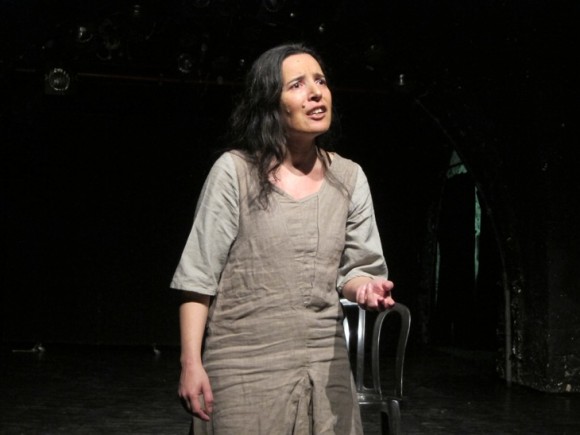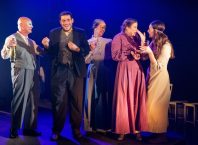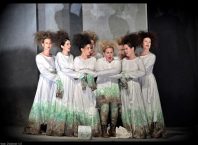In a country marked by war, a national narrative of mourning and remembrance is inevitable, essential, yet not without its inherent problems and internal contradictions. There is an inevitable distance between the public discourse and the personal experience of grief and loss. In Israel, Yom Hazikaron, The Day of Remembrance for the Fallen Soldiers of Israel and Victims of Terrorism, is immediately followed by Yom Ha’atzmaut, Independence Day, and its celebrations. The proximity is intended to remind us that this independence was hard won, to ensure that we will always honor and remember those who were killed in preserving this independence. Yet, at the end of the day, the flag returns to full staff, and the festivities begin, because the national need to remember is entangled with the need not to think too much about the pain and loss, to move on. Yet for some, death and loss have permeated every aspect of their lives, they remember every day, not just once a year, and they cannot move on. Is there an adequate way to acknowledge and respect their loss? Can we feel their pain?

Edut MeHaZman SheAhrei (Post-war Testimony), written, directed and performed by Snait Ben Gaash, presents the many hues and voices of loss and trauma in a one person play that takes the viewer through a compelling experience, conveyed in vivid imagery and movement, with relentless honesty and a mesmerizing performance. Ben Gaash is an outstanding actor, one who embodies each character entirely, changing before one’s eyes as she speaks. As a director, her sense of theatre, timing and space is impeccable; the text poetic and precise. Acknowledging the difficulty of the task and the vast chasm between the problematic subject matter and the theatre audience – she is taking something that no one really wants to think about and putting it center stage – she literally jumps right in to the thick of it, and pulls the viewer in with her.
1 2 3 Dag Maluach. Ben Gaash takes the audience to a place we’ve all been before: childhood and children’s games. Dag Maluach (in Hebrew it means literally, salted fish – pickled herring) closely resembles the game Red Light/Green Light: one person stands with her back to the group, and counts: 1 2 3 Dag Maluach, then quickly turns around. The others try to move forward while her back is turned, then freeze in place when she turns, not to be caught moving. Coming onto the stage from the audience, Ben Gaash embodies all the fierce emotions of childhood, her repetition of the phrase lo lazuz (don’t move), evokes the thrill and tensions, the energy and fear, the feeling that so much is at stake in this game. “Why doesn’t your father ever come to parents’ night?” In breath-taking rapid pace, Ben Gaash takes on the voices of the taunting children, as well as that of Hagit, the child whose father was killed in the war. Hagit expresses her own truth: “only my mother and I get to decide about my father.” Hagit does not want to move on, to say a final goodbye to her father. She has her own rituals: the magical thinking that if only she finds the right formula – “if I walk on tip toe, if I don’t step on the cracks…not dead – if I say it 60 times, 70 times” – her father will return.
Yet Hagit’s is not the only voice heard in this play dedicated to the concept of testimony. The play is not structured as a traditional narrative with a single plot line, but rather as individual scenes that create a palimpsest of characters, situations and feelings. The many layers accrue depth and symbolic power as one is drawn into this intimate portrait, a child’s game of hide and seek expresses a horrific reality beyond the ability of mere words. Ben Gaash presents the voices of Hagit’s mother, a clerk in the Ministry of Interior, Hagit’s teacher, other children, the medic present at the time of the father’s death, and a narrator. Accompanying the live action onstage are video projections of testimony by people who live with the trauma of war as an indelible part of their lives.
One of the many strengths of this outstanding performance is Ben Gaash’s striking ability to communicate with the audience, finding creative ways to bridge the abyss between those who know and those who do not know, how it feels. The precise and humor-inflected evocation of institutions and their discourse establishes an intimacy with the audience. We’ve all experienced the indifference of government clerks, we’ve all played games as kids, we’re all familiar with the scripted speech of teachers and other educational role models.
Donning a white blazer, Ben Gaash becomes a teacher, insistent on conveying the lessons of Remembrance Day to an unruly class. Her words are as funny as they are familiar: “Boaz, one more word and you’re out!” The classroom is an absurd parallel universe, where words are meaningful and yet empty: “In this class we are all one community.” Yet a community that does not acknowledge the differences and feelings of its members, a community in which one does not choose but is compelled to be a member, distorts the meaning of community. The discrepancy between the teacher’s words “we are cultured people” and the absurd reality in which cultured behavior is rewarded with a sticker, is hilarious, and one with which anyone who has ever been in a classroom can identify. When, in the name of this ‘community’ and its ‘culture’ the teacher forces Hagit to parade her personal grief before the class, we feel her alienation and her pain.
Yet in this sensitive and intelligent depiction of all that defies description in the magnitude of its pain and loss, Ben Gaash acknowledges the chasm that will always exist between those who know and those who do not know. For those of us who have not personally experienced loss, there is a choice. In the midst of the play, Ben Gaash addresses the audience directly: “Namshich? Shall we go on? We’ll continue with the testimony. You need to take responsibility for the degree of closeness or distance.”
There is an ever-widening chasm between the national need to portray those fallen in battle as heroes in a war that must be fought, and the need as individuals to ask why: why must we continue to fight, to kill and be killed? Why don’t we see that our most urgent national need is to put an end to war?
The 26th Theatronetto Festival took place from April 24 – 27th, 2016, under the artistic direction of Yaakov Agmon. The Nissim Azikri Prize for Best Actor was awarded to Snait Ben Gaash for her performance in Edut MeHazman SheAhrei (Post-war Testimony), which she also wrote and directed. The play is based on the testimonies of women and men whose lives have been irreversibly changed by war.





